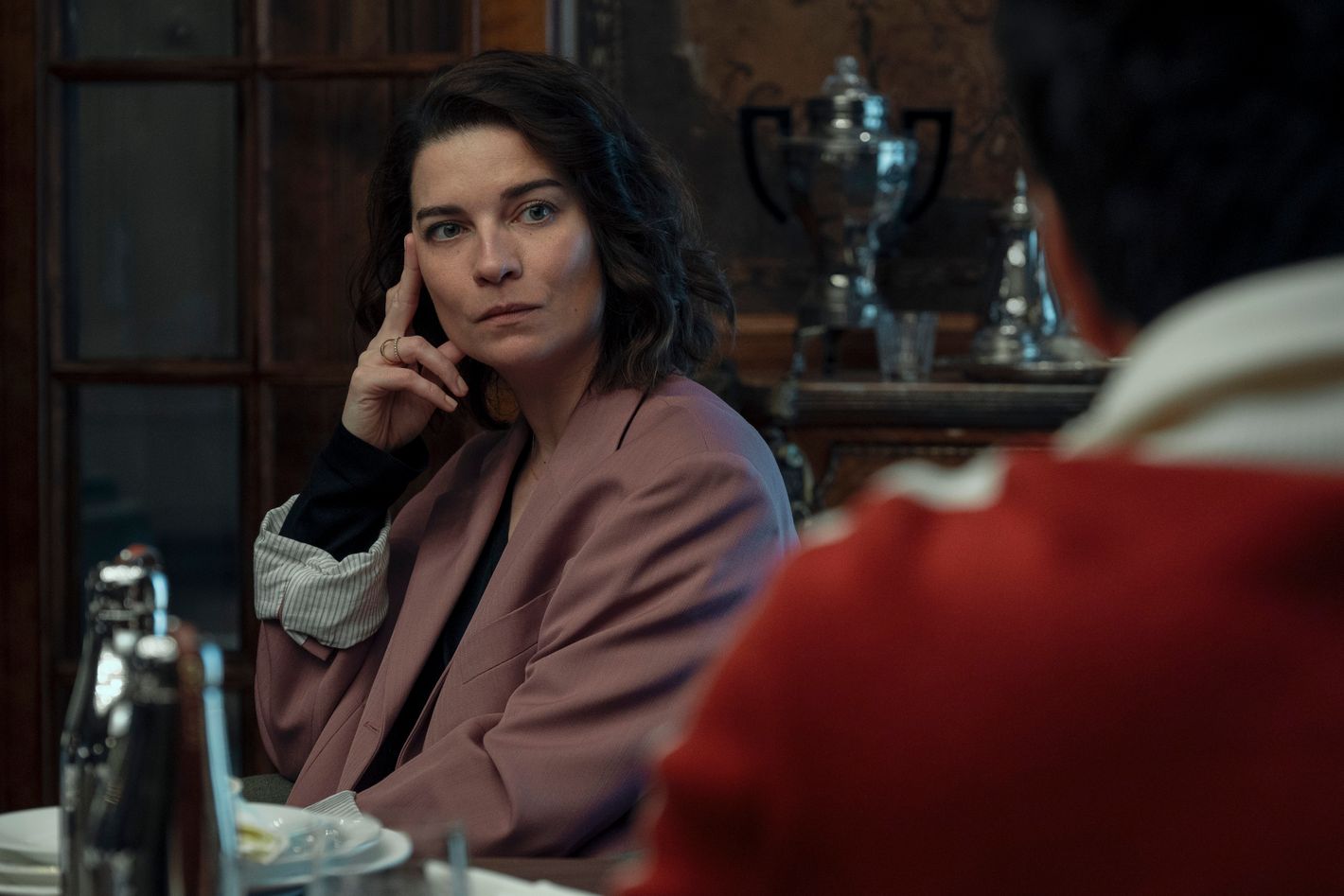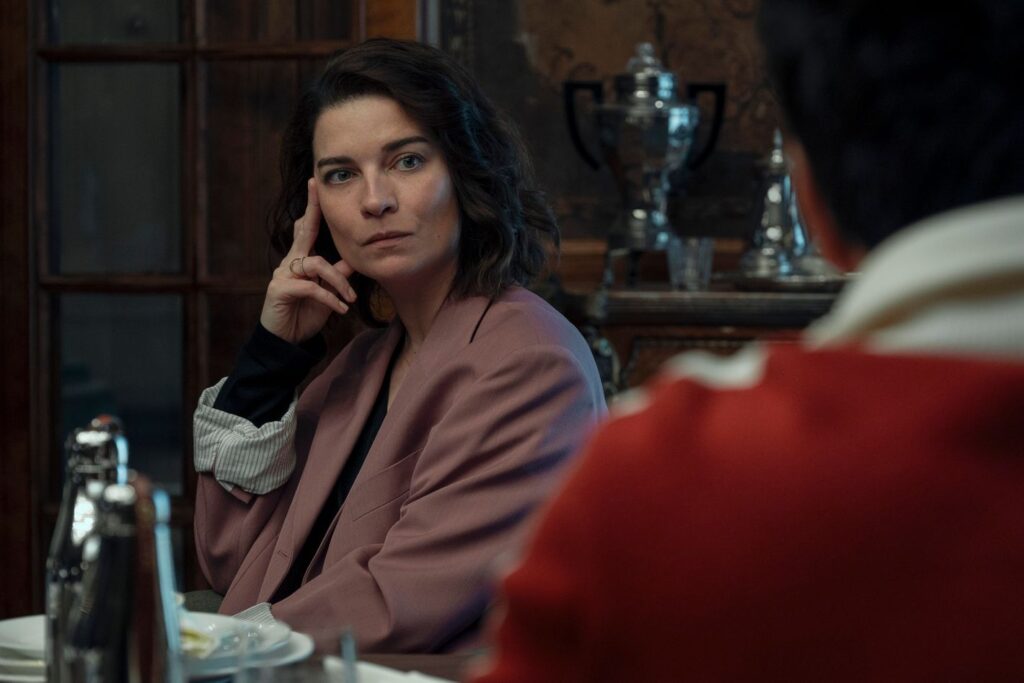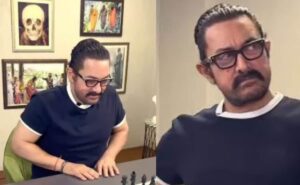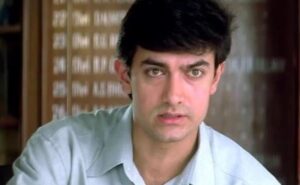
There is nothing more humbling or human than defeat. After weeks of twists and turns and getting away with increasingly opaque schemes, Masha has finally started to seem more like a person. She comes a quarter of the way alive after having to admit to herself that she may have misjudged how to best deal with the past. Improbably, since a generous estimate of his total lines up until this episode would put him at maybe ten words, it’s Matteo who gets through to her — like Masha, he has experienced tragic, absurd loss.
Masha’s come-to-Jesus moment culminates in the revelation that Helena, Zauberwald’s heiress and proprietor, is actually dead and has been all along. In the season premiere, Masha repeatedly sipped from a teacup, and though that imagery has largely disappeared by now, we know she’s on something, owing to her generally erratic behavior and the fact that she’s in constant contact with Tatiana. At the end of this week’s episode, we see that Helena’s office is covered in dust sheets. A portrait of her hangs on the wall, dating her death to 2022.
For Masha, the fact that a ghost presence is hallucinated makes little difference; she maintains that contact is real and potentially transformative, whether it’s drug-induced or not. Still, after Helena lays into her mercilessly, telling her that she is a “broken woman” who “breaks everyone she tries to heal,” Masha seems surprised that Helena’s ghost disappears into thin air. The Sixth Sense–like reveal that Helena is dead feels unearned, given the sheer volume of boy-crying-wolf moments throughout the season. At this point, nothing can faze me. You could tell me that in the eighth episode Masha will wake up and realize this was all a dream, and I wouldn’t bat an eye.
In “The Other Side,” Masha’s new therapy device is in full motion. At the beginning of the episode, she looks paranoid as she tells Helena that David is her “daughter’s murderer” and that her goal is to make him “atone,” which confirms that last week’s bizarre espionage plot was manufactured to manipulate him. When Helena suggests that the best way to deal with David is to forgive him — particularly when, as she says, Tatiana’s death was a random tragic accident — Masha retorts that she’s not the only one who has to forgive him. The camera pans to Matteo sleeping outside in the snow, then waking up in a panic at the sound of a helicopter.
When he comes inside, Matteo finds Imogen and Tina waking up on the floor of the ballroom, then runs up to check on Victoria. She is in bed, awake but “too weak to move,” having lost control of some of her limbs. She tells Matteo she only needs an hour or so to gather her strength, and he seems genuinely concerned about her, even asking when she will tell Imogen about her illness. So far, Matteo has been a non-character: He speaks little and is largely inconsequential to the plot. When David first arrived at Zauberwald, we learned that he and Agnes had briefly met at a field hospital in Kosovo in the ’90s; by the time Matteo is hooked up to Masha’s memory device, we learn that he’d been at that hospital, too, which was apparently financed by the Sharpe Foundation and Signal Op, David’s satellite-technology company.
Masha tries to guide Matteo to “interface with” his trauma, but he resists the work. Inside the memory of the field hospital, he tells Agnes that he knows the past can’t be changed. Tragedy struck when bombs hit the school where his parents worked and he improbably survived. Waking up, he tells Masha that he doesn’t want to “treat” his pain — his pain is part of who he is. He doesn’t want to stop missing his family because he doesn’t want to forget them. Then, inexplicably, he quotes from Brian Tumkin’s Crabapple Clubhouse: “There’s only one of me, and isn’t that wonderful?”
Matteo delivers this whole thing with a smile on his face, knowing that he’s teaching Masha a lesson: Making peace with the past is different from trying to fix it. Listening to him speak, Masha cries. Now, if we assume that her later exchange with Helena is a projection of her greatest insecurities, the harsh truths she’s telling herself in the deeper recesses of her brain, then we might come to the conclusion that Masha is on the brink of realizing the faults of her method. On a dialogue level, her exchange with Matteo is extremely heavy-handed, but it’s the most auspicious thing that has happened to her yet because it has the potential to put her at a crossroads. Will a brush with her own limitations make a difference in how she approaches the past?
Over two seasons, Masha has been blindly trusting her instincts, even when they have steered her wrong. Martin is the foremost person to notice this, and though he is privy to everything that happened when David underwent the “advanced” phase of the protocol in the lab, Martin pretends to be clueless. When he asks her how it went with David — and whether he might want to invest in Zauberwald — she tells him it went beautifully and that they should put Peter through it next. But Peter is a skeptical subject: He is convinced, after learning that David was Tatiana’s father, that Masha has made this all up in order to get his money.
In an old-school-Masha turn, Peter somehow goes from his one-on-one to being hooked to the psychedelic-delivery device without explicit consent. However, Martin reminds him later that he waived his soul away in the many forms he signed before coming to the retreat. Peter’s formative traumatic memory is of his parents telling him they’re getting divorced as he plays a video game. When he jolts awake, he freaks out. Sweating bullets in what Masha calls his “childhood state,” he tells her not to come near him, that she is lying and trying to get to his father’s money, and bolts from the room to look for David, the device still hooked to his chest.
He ends up in the breakfast room, where Brian and Agnes are playing with a couple of marionettes Brian bought in the village. Peter tries frantically to warn everyone of Masha’s manipulations as Martin tries to contain him. Masha herself appears to announce that the “new phase” in her “therapeutic work” has begun. She explains that guests will be prompted to go back to a core traumatic memory in order to relive it, “dredge up those feelings and fears that are buried in that memory, and burn them away, and together, we will build a new one.” “A new memory?” Imogen asks. No, “a new response to that memory, a new closure, a new truth,” Masha says, which to me sounds like the same thing. The goal, it seems, is to replace these traumatic experiences with non-traumatic ones; Matteo’s point is that when you do that, you lose a piece of yourself.
But Imogen is all for it. When Masha asks who wants to go next, she readily volunteers. While Masha takes Matteo, Martin takes Imogen and Victoria, who agrees to tag along only after Imogen airs their dirty laundry in front of everyone, chastising her mother for “ditching” her the previous night. While they take off to continue protocol, Peter — who at this point has completely lost track of the memory or the goal of rebuilding it — becomes convinced that his father is missing and sets out to find him. Masha directs him to look for him on “the other side,” which Martin clarifies is just the other side of the Zauberwald campus. He finds a map on a wall and takes it with him, trampling wildly through the snow.
Ultimately, Peter finds David in a mud bath. It’s anything but a helpful image for someone who is tripping balls, but at least he’s happy to have found him alive and well. Later, a little bit less high, he’s still convinced Masha is lying about David being Tatiana’s father. But David is very impressed by Masha’s memory therapy and sees a major business opportunity in the psychedelic-delivery device as a product. It was Peter who convinced him to go there, so David tells him they could build the business together, and the twinkle in Peter’s eye — so far a guileless, boyish look — becomes slightly darker and more sinister.
Agnes, Brian, Wolfie, and Tina, who are just regular high from the usual thermos, find this all hilarious and take advantage of the day’s chaos to have fun on their own terms. They decide to follow Peter’s quest until they end up at the spa, where they take a wine bath, laugh, and play “fuck, marry, kill.” Feeling tender toward his new friends, Brian discloses that he feels the treatment is working; he feels better and lighter. All four of them have recovered their faith in their own ability to have fun. It’s a sweet moment, but on a narrative level, again, it feels unearned. It’s not very clear what changed for them except that they are on drugs and said some shit to one another. Tina and Wolfie’s fight ends abruptly, as if what they were arguing over was not their fundamental incompatibility but what to have for dinner. Their sudden change of heart seems like an easy resolution for the show as it digs deeper into other, more convoluted levels of plot: namely, putting David at the center of most of the guests’ traumas.
There is a suggestion running through this week’s episode that Masha’s memory technology parallels David’s satellite work in that they both play God, interfering in people’s pasts and their futures. David pops up not only in Matteo’s formative trauma, but also, obliquely, in Imogen’s. When Martin first plugs Imogen into the device, Victoria still maintains that she doesn’t want to take the drugs, but when she hears Imogen say that the memory she wants to revisit is of being a little girl whose family was still intact, Victoria decides she doesn’t want her daughter to go through it alone. So Martin hooks her up, too, and they reexperience being in a new house together. Putting Imogen to bed, Victoria tells her that her dad is a hero because he built a “special satellite that can keep people safe by finding anything in the world.”
Next we see Imogen; she finds her dad a few beers deep, watching a news broadcast that announces drone strikes facilitated by Signal Op. The boy walking through the field hospital in the television merges into Matteo. The suggestion is that whatever technology her father developed was used to make or guide the drones that, with Signal Op’s help, killed Matteo’s family. Imogen’s memory leads her straight into her traumatic core: A little girl out of the pool, she finds her father dead in his room, supposedly by suicide. Just as Imogen jolts awake, Victoria suffers a seizure. When Martin contacts Masha to say what happened, Masha tells him Victoria’s medicine wasn’t correctly calibrated — and it’s only when the EMT arrives in a chopper that Matteo tells us, and Imogen, that Victoria has ALS and that he is not only her boyfriend but also her caretaker. All of this points to the fact that Masha has been barreling toward the wrong conclusions. Also, that’s the third time over the course of her career as a wellness guru that Masha has put a guest’s life at risk; we know at least one person died in early iterations of Tranquillum House, and Heather Marconi nearly bit it after some strong dosage last season.
The question now, for Masha as for us, is whether the realization that she may have been wrong will have any consequence for her character or the plot. This episode is one of the most satisfying of the season because it’s more dedicated to plot than to explanation: Things are happening which will force characters to make decisions. What will Masha do next? What will come out of Signal Op and the Sharpe Foundation — how deep does that hole go? What’s the connection between Imogen’s father and the Sharpes? How much does Matteo know, and how much will he be willing to forgive? Will this camerawork ever stabilize?
Masha realizes that manipulating people and hooking them up to a psychedelic-delivery device may not be the best way to heal their trauma.

































































